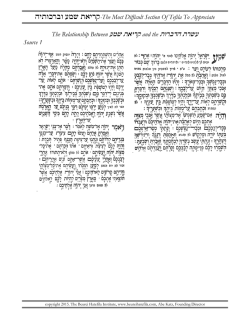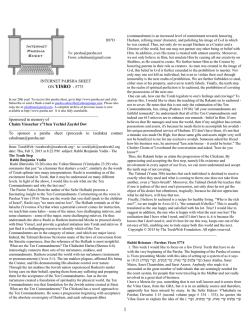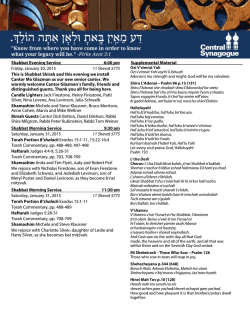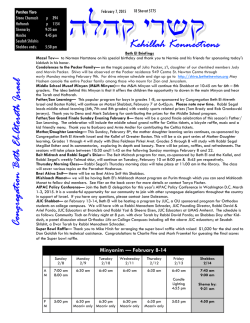
To Download Source Sheet For Lesson 3
dizekxae rny z`ixw-The Most Difficult Section Of Tefila To Appreciate
The Theme Of The Opening rny z`ixw zekxa
Rule: The themes of the first three rny z`ixw zekxa in zixgy zltz and zltz
ziaxr mirror each other. To understand either set of zekxa, you need to study
both sets. The differences between the zekxa need to be explained which
provide a further tool in comprehending them.
Source 1
zg`e diptl mizy jxan xgya .dpyn-'` 'nr '`i sc zekxa zkqn ilaa cenlz
mewn .dxvw zg`e dkex` zg` ,dixg`l mizye diptl mizy jxan axrae ,dixg`l
`ly i`yx epi` ,mezgl ,jix`dl i`yx epi` xvwl ,xvwl i`yx epi`,jix`dl exn`y
iax xn` awri iax xn` ?jxan i`n .`xnb .mezgl i`yx epi` ,mezgl `ly ,mezgl
!dbep `xeae xe` xvei :`nil .jyg `xeae xe` xvei (d"n ediryi)-a cenr `i sc - `irye`
?aizkck opixn` `w in ,rx `xeae mely dyr (d"n ediryi) :dzrn `l` .opixn`w aizkck
xn` `l` !`ilrn `pyil dbep `nil inp `kd ,`ilrn `pyil lkd opixwe rx aizk ,`l`
:opixn`ck meia dlil zcn `nlya .meia dlil zcne dlila mei zcn xikfdl ick :`ax
iptn xe` lleb :iia` xn` ?dl zgkyn ikid dlila mei zcn `l` ,jyg `xeae xe` xvei
.xe` iptn jyge jyg
Translation: MISHNAH. In the morning two Brachos are to be said before Kriyas Shema and one after
it. In the evening two are said before Kriyas Shema and two after it, one long and one short. Where the
sages ruled that a long Bracha should be said, it is not permitted to say a short one. Where the Sages
ordained a short Bracha a long one is not permitted. A prayer which the Sages ordered to be concluded with
a benediction must not be left without such a conclusion. A prayer which the Sages ordered to be left without
such a conclusion must not be so concluded. GEMARA. What is the first Bracha that one says before
Kriyas Shema in the morning? Rav Jacob said in the name of Rav Oshaia:‘Blessed are You who forms
light and creates darkness’. Let him say rather: ‘Who forms light and creates brightness’? We want to stay
with the language of the Scripture. If that is so, what of the next words in the text, Who makes peace and
creates evil: do we repeat those words as they are written? It is written ‘evil’ and we say ‘all things’ as a
euphemism. Then here too let us say ‘brightness’ as a euphemism! In fact, replied Raba, it is in order to
mention the distinctive feature of the day in the night-time and the distinctive feature of the night in the
day-time. It is correct that we mention the distinctive feature of the night in the day-time, as we say, ‘Who
forms light and creates darkness’. But where do you find the distinctive feature of the day mentioned in the
night-time? Abaye replied: In the words, ‘You roll away the light from before the darkness and the
darkness from before the light’.
Source 2
cr ,zepyl mikyd :l`eny xn` dcedi ax xn`-a cenr `i sc zekxa zkqn ilaa cenlz
xhtp xaky ,jxal jixv epi` rny z`ixw `xwyn ,jxal jixv rny z`ixw `xw `ly
.dax dad`a
copyright 2015. The Beurei Hatefila Institute, www.beureihatefila.com, Abe Katz, Founding Director
dizekxae rny z`ixw-The Most Difficult Section Of Tefila To Appreciate
Translation: R. Yehudah said in the name of Shmuel: concerning he who wakes early to
study Torah, provided he has not yet recited Kriyas Shema, he should recite the Birchos
Ha’Torah. However, had healready recited Kriyas Shema, it is no longer necessary to recite
the Birchos Ha’Torah before studying Torah because he fulfilled his obligation to recite
Birchos Ha’Torah by saying the Bracha of Ahava Rabbah.
Source 3
lr :ongp xa l`eny iax mya oeniq 'x-b xeh b sc ` wxt zekxa zkqn inlyexi cenlz
ryedi 'x mya oia` 'xa iqei 'x .oiey dlilde meid ziibd `dzy ,dlile mnei ea zibde my
ray miiwnd lk :ipn 'x mya ongp 'x .jwcv ihtyn lr jizlld meia ray my lr iel oa
.dlile mnei ea zibde miiw eli`k jizlld meia
Translation: Rav Simon in the name of Rav Shmuel son of Nachman says: the total number of Brachos
that are recited before and after Kriyas Shema is based on a verse: you shall be involved in studying Torah
in the day and at night. This is interpreted to mean that your involvement with Torah learning should be
equal both in the day and at night. Rav Yossi son of Rav Avin in the name of Rav Yehoshua son of Levi
opined: there are seven Brachos of Kriyas Shema each day based on the verse: seven times a day I shall
praise You for your just rulings. Rav Nachman in the name of Rav Mani said: whoever fulfills the
requirements of the verse: seven times a day I shall praise You (recites seven Brachos of Kriyas Shema each
day) has fulfilled his obligation of being involved in Torah learning day and night.
Source 4
zegpn) mgld izy wxt ilaa xn`c rny zixw epiid-oiey dlilde meid ziibd -micxg
zixgy rny zixw `l` mc` `xw `l elit` i`gei xa oerny iax my opgei iax (:'hv
zekxa dl epiwz daiag d`ixw `idy itle .dlile mnei ea zibde yeni `l miiw ziaxre
.dxez xtq z`ixw lr epiwzy enk dixg`le diptl
Translation: When Rav Simon stated that our involvement in Torah must be the same at night as it was
during the day, he was referring to reciting Kriyas Shema. This was based on what we learned in the
Babylonian Talmud: Rav Yochonon in the name of Rav Shimon Bar Yochai said that if all a person did
during the day was to read Kriyas Shema during Tefilas Shacharis and Tefilas Maariv, he fulfilled the
obligation to be involved in Torah study all day and all night. Because Kriyas Shema is a cherished activity,
our Sages instituted the practice of reciting Brachos before reading it and after . This is similar to the
practice that Chazal instituted concerning Kriyas Ha’Torah, to recite a Bracha both and after reading from
the Torah.
Source 5
The first dkxa of rny z`ixw that is recited by individuals praying alone each day
according to the xeciq of oe`b dicrq ax.
copyright 2015. The Beurei Hatefila Institute, www.beureihatefila.com, Abe Katz, Founding Director
dizekxae rny z`ixw-The Most Difficult Section Of Tefila To Appreciate
A copy of the xeciq of oe`b dicrq ax can be accessed at: hebrewbooks.org/20685
Source 6
`l` mler zad` mixne` oi` :ikd inp `ipz-a cenr `i sc zekxa zkqn ilaa cenlz
jizad` mler zad`e (a ,`l edinxi) xne` `ed oke ,mler zad` :ixn` opaxe .dax dad`
.cqg jizkyn ok lr
Translation: We learned additionally as follows: we do not open the Bracha before Kriyas Shema with the
words: Ahavas Olam. Instead we open the Bracha with the words: Ahava Rabbah. The majority of
Rabbis say: No. The Bracha should open with the words: Ahavas Olam based on the verse: (Yirmiyahu
32, 2) An everlasting love have I bestowed upon you. Therefore I extended kindness to you.
Source 7
on oic oilawne .eceak ux`d lk `ln ,ze`-av d yecw yecw | yecw ,xn`e df l` df `xwe
yicw ,dzxeab caer `rx` lr yicw ,dzpiky zia d`lr `nexn inya yicw ,oixn`e ,oic
.dxwi eif `rx` lk `iln ,ze`av d ,`inlr inlrle mlrl
The Koren Siddur translates the Aramaic Targum to the weqt as follows:
And they receive permission from one another, saying: Holy in the highest heavens, home of His presence;
holy on earth, the work of His strength; holy for ever and all time is the Lord of hosts; the whole earth is
full of His radiant glory.
Source 8
In Christian theology, the appearance of the word yecw three times (Trisagion) by the
angels in heaven confirms the existence of the Trinity. Below is a part of the prayer they
recite. Notice how they interpret each reference to the word: yecw:
Holy God
Holy and Mighty
Holy Immortal One
Have mercy, have mercy on us.
Source 9
lyn ezllw daexn meie mei lka :`ax xn` -'` 'nr 'hn sc dheq zkqn ilaa cenlz
?xwa id ;xwa ozi in xn`z axrae ,axr ozi in xn`z xwaa (gk mixac) :xn`py ,exiag
dyecw` ?miiwn `w i`n` `nlr `l`e .silgc `l` ?ied i`n rci in ,xgnlc xwa `nili`
`le zenlv lte` enk dztr ux` ('i aei`) :'`py ,`zcb`c `ax diny `di`e `xciqc
.lte`n ritez - mixcq yi `d ,mixcq
copyright 2015. The Beurei Hatefila Institute, www.beureihatefila.com, Abe Katz, Founding Director
dizekxae rny z`ixw-The Most Difficult Section Of Tefila To Appreciate
Translation: Rabba said: And the curse of each day is severer than that of the preceding day, as it is
stated: In the morning you shall say: If only it were possible that G-d advance the time so that it be evening!
And at evening you shall say: If only it were possible that G-d advance the time so that it be morning.
Which morning are they longing for? If you say it is the morning of tomorrow, does anyone know that it
will not present an even more difficult circumstance? Therefore it must be that they were longing for the
morning of the day before. In that case, why does G-d allow the world to endure? Because of the recital of the
words of Kedushah and their Aramaic translation at the end of the prayer service and the Kaddish that is
recited after the Scriptural reading, and the response of “May His great Name be blessed” which is uttered
in the Kaddish after studying Midrash; as it is stated: A land of thick darkness, as darkness itself, a land
of the shadow of death, without any order. Hence if there are Scriptural readings, the readings bring light to
the thick darkness.
copyright 2015. The Beurei Hatefila Institute, www.beureihatefila.com, Abe Katz, Founding Director
© Copyright 2026



